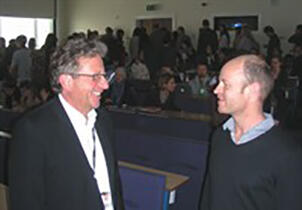
LSTM’s seminar series continued today with a lecture entitled ‘HIV treatment scale up in resource-limited settings: evolving global policy in a rapidly changing environment.’ It was presented by LSTM alumnus Dr Nathan Ford, who is currently based at the HIV/AIDS Department of the World Health Organization (WHO).
The seminar, introduced by LSTM Professor Paul Garner, highlighted some of the major breakthroughs in recent years that have informed major global changes in HIV policy and practice. It also demonstrated the impact of antiretroviral therapy (ART) on reducing HIV infection.
Dr Ford’s insight into the forthcoming WHO guidelines on HIV treatment, presented the need for simplifying the drugs used in treatment, improvements in point of care diagnostics and support for community-based delivery of treatment. Explaining, that reducing the cost of treatment has been of huge significance “a cost of $10,000 per patient per year, ten years ago, has been reduced to $50 today.”
On improving the take-up and continuation of ART treatment “there is now good evidence to suggest we should be getting out of clinics and into point of care testing at peoples’ homes.”
Treatment as prevention is a policy being put into practice “treating HIV is not just to save the lives of those infected with HIV, it is important to protect the lives of those who may also become infected”, with “36% of sex workers in sub-Saharan Africa infected with HIV.”
The seminar stimulated a discussion about the ways in which WHO uses evidence to inform future HIV/AIDS policy in a rapidly changing scientific, epidemiological, and funding environment. Highlighting work by LSTM’s Dr Miriam Taegtmeyer in developing a new policy brief on HIV treatment for WHO, entitled: Planning, implementing and monitoring, home-based HIV testing and counselling: a practical handbook for sub-Saharan Africa.
Dr Ford regularly returns to LSTM as a guest lecturer. He has previously worked with Médecins Sans Frontières (MSF) supporting operational research and medical advocacy. He holds a degree in Microbiology and Virology (Warwick) a Masters in Public Health and Epidemiology (Cape Town), a PhD in Clinical and Public Health epidemiology (Vancouver) and completed the Diploma in Humanitarian Assistance at LSTM. He serves on various editorial boards, including the Journal of the International AIDS Society and Conflict and Health. Areas of concern include evidence-based humanitarian action, and simplification and adaptation of HIV/AIDS care in resource-limited settings.